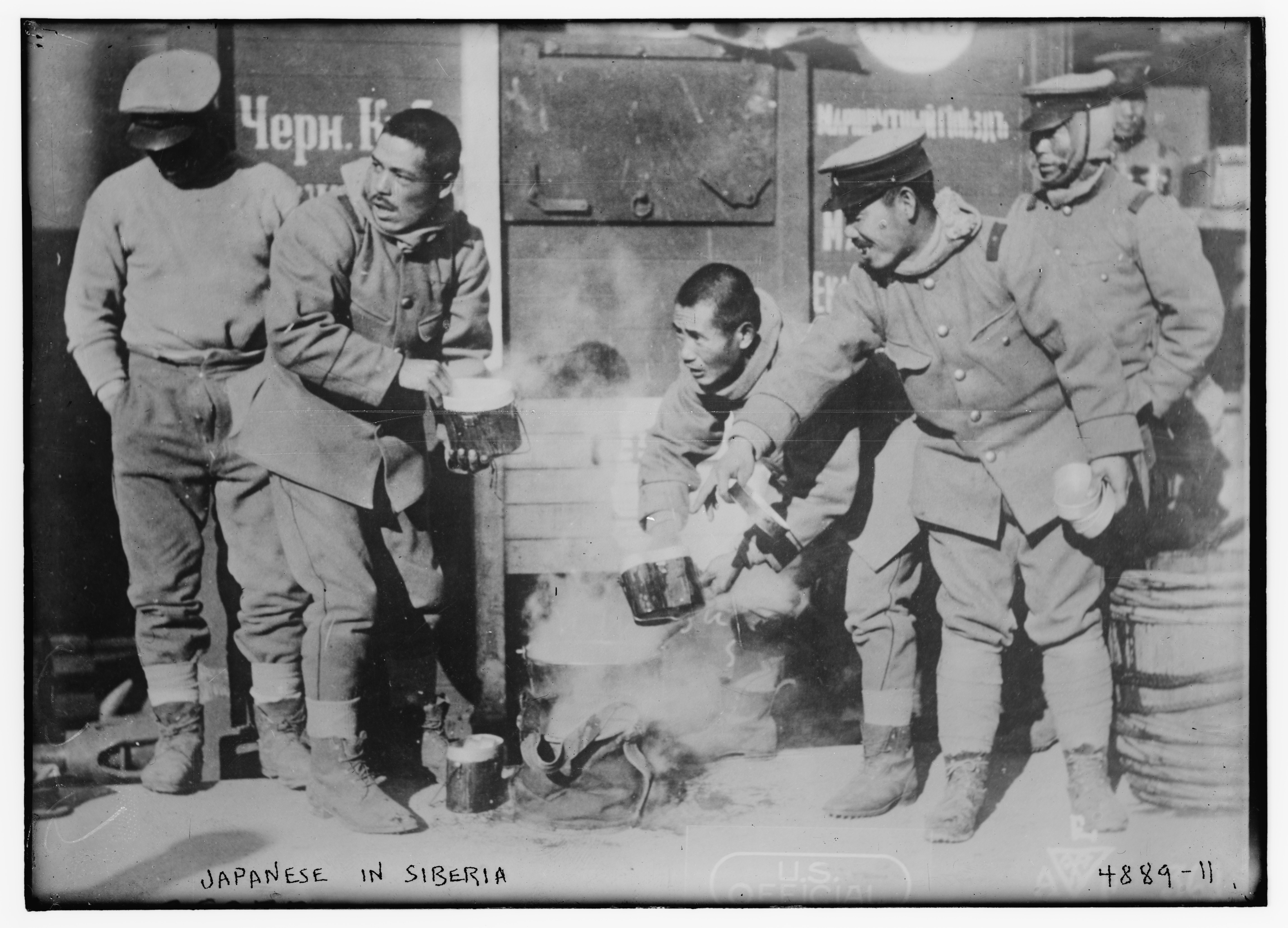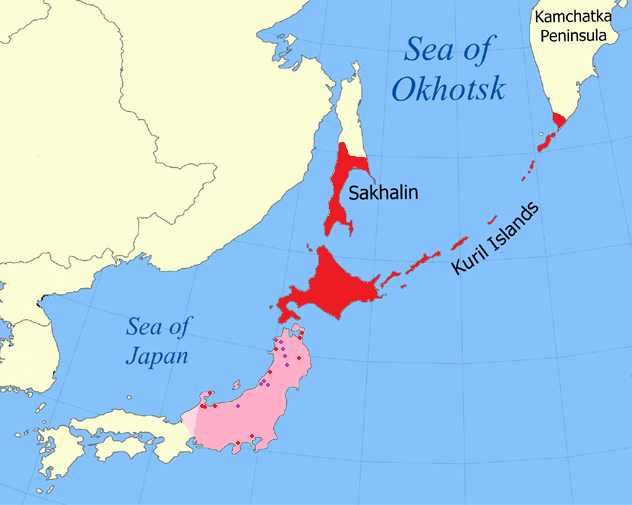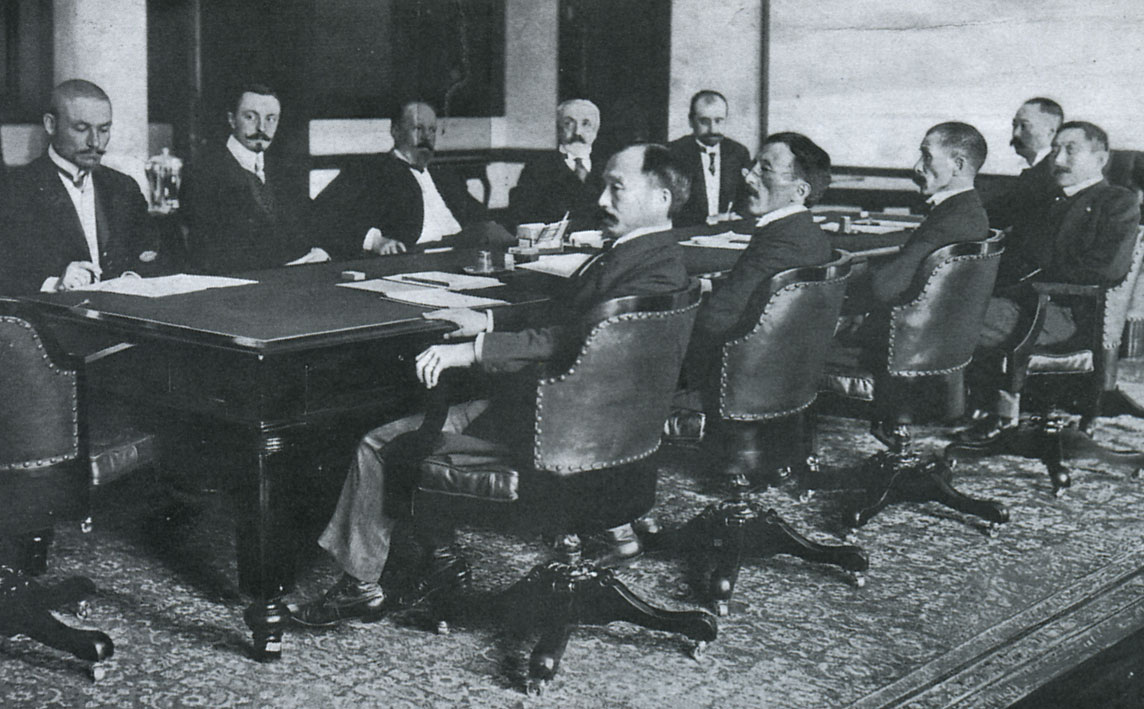|
Japan–Soviet Union Relations
Relations between the Soviet Union and Japan between the Communist takeover in 1917 and the collapse of Communism in 1991 tended to be hostile. Japan had sent troops to counter the Bolshevik presence in Russia's Far East during the Russian Civil War, and both countries had been in opposite camps during World War II and the Cold War. In addition, territorial conflicts over the Kuril Islands and South Sakhalin were a constant source of tension. These, with a number of smaller conflicts, prevented both countries from signing a peace treaty after World War II, and even today matters remain unresolved. Strains in Japan–Soviet Union relations have deep historical roots, going back to the competition of the Japanese and Russian empires for dominance in Northeast Asia. The Soviet government refused to sign the 1951 peace treaty and the state of war between the Soviet Union and Japan technically existed until 1956, when it was ended by the Soviet–Japanese Joint Declaration of 1956 ... [...More Info...] [...Related Items...] OR: [Wikipedia] [Google] [Baidu] |
Allied Intervention In The Russian Civil War
The Allied intervention in the Russian Civil War consisted of a series of multi-national military expeditions that began in 1918. The initial impetus behind the interventions was to secure munitions and supply depots from falling into the German Empire's hands, particularly after the Bolsheviks signed the Treaty of Brest-Litovsk, and to rescue the Allied forces that had become trapped within Russia after the 1917 October Revolution. After the Armistice of 11 November 1918, the Allied plan changed to helping the White movement, White forces in the Russian Civil War. After the Whites collapsed, the Allies withdrew their forces from Russia by 1925. Allied troops landed in Arkhangelsk (the North Russia intervention of 1918–1919) and in Vladivostok (as part of the Siberian intervention of 1918–1922). The British also British campaign in the Baltic (1918–1919), intervened in the Baltic theatre (1918–1919) and Dunsterforce, in the Caucasus (1917–1919). French-led Allied force ... [...More Info...] [...Related Items...] OR: [Wikipedia] [Google] [Baidu] |
Imperial Japanese Army
The Imperial Japanese Army (IJA; , ''Dai-Nippon Teikoku Rikugun'', "Army of the Greater Japanese Empire") was the principal ground force of the Empire of Japan from 1871 to 1945. It played a central role in Japan’s rapid modernization during the Meiji period, fought in numerous conflicts including the First Sino-Japanese War, the Russo-Japanese War, World War I, the Second Sino-Japanese War, and World War II, and became a dominant force in Japanese politics. Initially formed from domain armies after the Meiji Restoration, it evolved into a powerful modern military influenced by French and German models. The IJA was responsible for several overseas military campaigns, including the invasion of Manchuria, involvement in the Boxer Rebellion, and fighting across the Asia-Pacific during the Pacific War. Notorious for committing widespread Japanese war crimes, war crimes, the army was dissolved after Japan's surrender in 1945, and its functions were succeeded by the Japan Ground Self-D ... [...More Info...] [...Related Items...] OR: [Wikipedia] [Google] [Baidu] |
Joseph Stalin
Joseph Vissarionovich Stalin (born Dzhugashvili; 5 March 1953) was a Soviet politician and revolutionary who led the Soviet Union from 1924 until Death and state funeral of Joseph Stalin, his death in 1953. He held power as General Secretary of the Communist Party of the Soviet Union, General Secretary of the Communist Party from 1922 to 1952 and as the fourth Premier of the Soviet Union, premier from 1941 until his death. He initially governed as part of a Collective leadership in the Soviet Union, collective leadership, but Joseph Stalin's rise to power, consolidated power to become an absolute dictator by the 1930s. Stalin codified the party's official interpretation of Marxism as Marxism–Leninism, while the totalitarian political system he created is known as Stalinism. Born into a poor Georgian family in Gori, Georgia, Gori, Russian Empire, Stalin attended the Tiflis Theological Seminary before joining the Marxist Russian Social Democratic Labour Party. He raised f ... [...More Info...] [...Related Items...] OR: [Wikipedia] [Google] [Baidu] |
Sino-Soviet Conflict (1929)
The Sino-Soviet conflict of 1929 (, ) was an armed conflict between the Soviet Union and the Chinese warlord Zhang Xueliang of the Republic of China over the Chinese Eastern Railway (also known as the CER). The conflict was the first major combat test of the reformed Soviet Red Army, which was organized along the latest professional lines, and ended with the mobilization and deployment of 156,000 troops to the Manchurian border. Combining the active-duty strength of the Red Army and border guards with the call-up of the Far East reserves, approximately one in five Soviet soldiers was sent to the frontier, the largest Red Army combat force to be fielded between the Russian Civil War (1917–1922) and the Soviet Union's entry to the Winter War (1939-1940).Michael M. Walker, ''The 1929 Sino-Soviet War: The War Nobody Knew'' (Lawrence: University Press of Kansas, 2017), p. 1. In 1929, the Chinese Northeastern Army took over the Chinese Eastern Railway to regain sole control of it. ... [...More Info...] [...Related Items...] OR: [Wikipedia] [Google] [Baidu] |
Sakhalin Island
Sakhalin ( rus, Сахали́н, p=səxɐˈlʲin) is an island in Northeast Asia. Its north coast lies off the southeastern coast of Khabarovsk Krai in Russia, while its southern tip lies north of the Japanese island of Hokkaido. An island of the West Pacific, Sakhalin divides the Sea of Okhotsk to its east from the Sea of Japan to its southwest. It is administered as part of Sakhalin Oblast and is the largest island of Russia, with an area of . The island has a population of roughly 500,000, the majority of whom are Russians. The indigenous peoples of the island are the Ainu, Oroks, and Nivkhs, who are now present in very small numbers. The island's name is derived from the Manchu word ''Sahaliyan'' (), which was the name of the Qing dynasty city of Aigun. The Ainu people of Sakhalin paid tribute to the Yuan, Ming, and Qing dynasties and accepted official appointments from them. Sometimes the relationship was forced but control from dynasties in China was loose ... [...More Info...] [...Related Items...] OR: [Wikipedia] [Google] [Baidu] |
League Of Nations Treaty Series
A treaty series is an officially published collection of treaties and other international agreements. Americas Canada Treaties in force for Canada are published in the Canada Treaty Series. United States Treaties and international agreements were formally published in ''Statutes at Large'' (Stat.) until 1948. The Department of State also published a number of collections relating specifically to treaties and other agreements: *''Foreign Relations of the United States'' (FRUS), published under various names since 1861 *''Treaty Series'' (TS or USTS), issued singly in pamphlets until 1945 *''Executive Agreement Series'' (EAS), issued singly in pamphlets until 1945 *''Treaties and Other International Agreements of the United States of America 1776–1949'' (Bevans), compiled by Charles I. Bevans for the State Department from 1968-1976 After 1948, agreements have been published as Senate Documents (S.Doc.), House Documents (H.Doc.) or in the Federal Register (F.R. or F.Reg ... [...More Info...] [...Related Items...] OR: [Wikipedia] [Google] [Baidu] |
Imperial Japan
The Empire of Japan, also known as the Japanese Empire or Imperial Japan, was the Japanese nation state that existed from the Meiji Restoration on January 3, 1868, until the Constitution of Japan took effect on May 3, 1947. From Japan–Korea Treaty of 1910, 1910 to Japanese Instrument of Surrender, 1945, it included the Japanese archipelago, the Kuril Islands, Kurils, Karafuto Prefecture, Karafuto, Korea under Japanese rule, Korea, and Taiwan under Japanese rule, Taiwan. The South Seas Mandate and Foreign concessions in China#List of concessions, concessions such as the Kwantung Leased Territory were ''de jure'' not internal parts of the empire but dependent territories. In the closing stages of World War II, with Japan defeated alongside the rest of the Axis powers, the Japanese Instrument of Surrender, formalized surrender was issued on September 2, 1945, in compliance with the Potsdam Declaration of the Allies of World War II, Allies, and the empire's territory subsequent ... [...More Info...] [...Related Items...] OR: [Wikipedia] [Google] [Baidu] |
Treaty Of Portsmouth
The Treaty of Portsmouth is a treaty that formally ended the 1904–1905 Russo-Japanese War. It was signed on September 5, 1905, after negotiations from August 6 to 30, at the Portsmouth Naval Shipyard in Kittery, Maine, United States. U.S. President Theodore Roosevelt was instrumental in the negotiations and won the Nobel Peace Prize for his efforts, the first ever American recipient. The treaty recognized Japan's hegemony in Korea (which soon after became a protectorate of the Empire of Japan), awarded it Russia's lease on the Liaodong Peninsula (which became the Kwantung Leased Territory), control of the Russian-built South Manchuria Railway, and the southern half of the island of Sakhalin (Karafuto). Background The war of 1904–1905 was fought between the Russian Empire, an international power with one of the largest armies in the world, and the Empire of Japan, a nation that had only recently industrialized after two-and-a-half centuries of isolation. A series of battl ... [...More Info...] [...Related Items...] OR: [Wikipedia] [Google] [Baidu] |
Soviet–Japanese Basic Convention
The was a treaty normalizing relations between the Empire of Japan and the Soviet Union that was signed on 20 January 1925. Ratifications were exchanged in Beijing on February 26, 1925. The agreement was registered in ''League of Nations Treaty Series'' on May 20, 1925. Background Following the defeat of the Russian Empire in the Russo-Japanese War of 1904–1905, co-operative relations between Russia and Japan were gradually restored by four sets of treaties signed between 1907 and 1916. However, the collapse of the Romanov dynasty, followed by the Bolshevik Revolution and the Japanese Siberian Intervention created a strong distrust between Japan and the newly founded Soviet Union. Signing The treaty was signed by Lev Mikhailovich Karakhan of the Soviet Union and Kenkichi Yoshizawa of Japan on 20 January 1925. Terms Following a series of negotiations held in Beijing in 1924 and 1925, Japan agreed to extend diplomatic recognition to the Soviet Union and to withdraw its troo ... [...More Info...] [...Related Items...] OR: [Wikipedia] [Google] [Baidu] |
Transbaikal
Transbaikal, Trans-Baikal, Transbaikalia ( rus, Забайка́лье, r=Zabaykal'ye, p=zəbɐjˈkalʲjɪ), or Dauria (, ''Dauriya'') is a mountainous region to the east of or "beyond" (trans-) Lake Baikal at the south side of the eastern Siberia and the south-western corner of the Far Eastern Russia. The steppe and wetland landscapes of Dauria are protected by the Daursky Nature Reserve, which forms part of a World Heritage Site named " Landscapes of Dauria". Geography Dauria stretches for almost 1,000 km from north to south from the Patom Plateau and North Baikal Highlands to the Russian state borders with Mongolia and China. The Transbaikal region covers more than 1,000 km from west to east from Lake Baikal to the meridian of the confluence of the Shilka and Argun Rivers. To the west and north lies the Irkutsk Oblast; to the north the Republic of Sakha (Yakutia), to the east the Amur Oblast. Oktyabrsky (Октябрьский) village, Amur Oblast, near ... [...More Info...] [...Related Items...] OR: [Wikipedia] [Google] [Baidu] |






